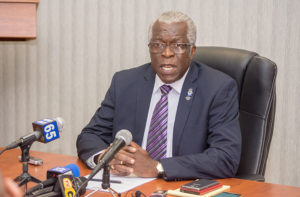The Guyana Civil Aviation Authority (GCAA) is expanding its training to include hinterland residents being trained as air traffic controllers.
One of the Authority’s 2018 projections is the training of a minimum of 20 hinterland residents as air traffic controllers.

Director General of the Guyana Civil Aviation Authority (GCAA), Lieutenant Colonel (retd) Egbert Field, told the Department of Public Information (DPI) that hinterland residents would benefit from this training exercise.
Field explained that the air traffic control programme will commence by April of this year. “A new course will start, and we will be targeting some of the outlying regions when it comes to applicants for the training course,” he disclosed.
Finance Minister Winston Jordan had, in his 2018 budget speech, announced that Government was negotiating with a multilateral donor to secure a US$15 million loan, to finance a project under which the Lethem airstrip would be upgraded into a regional hub and international aerodrome.
Field has said that with this venture coming on stream, the GCAA would be training new air traffic controllers in order to address the current shortfall and have an adequate number of officers in place.
“At the moment, our capacity doesn’t allow us to do inspections, so this will assist us in not only relieving the shortage which we suffer from right now, but also assist in the movement of aircraft in the Lethem region,” he advanced.
The Director-General emphasised that as the aviation sector prepares to enter a new phase, the authority is ensuring that hinterland communities are not left out.
Guyana’s Civil Aviation Training School (CATS) received its accreditation last July, enabling it to offer courses approved and recognised by the International Civil Aviation Organisation (ICAO).
With enhanced equipment and the new state-of-the-art, three-dimensional simulator, it is also the aim of the GCAA to conduct several courses this year. The Authority is in the process of enhancing and upgrading all the facilities in the school, so that students’ training requirements can be satisfied.
“This course, which will start in April, will be the first for this year; and in the last half of the year, another course will be done. We’re in the process of shortlisting students to undertake the course. At the same time we’re running introductory courses, we’re also upgrading our air traffic controllers in air control and other courses they need to do,” Field said.



